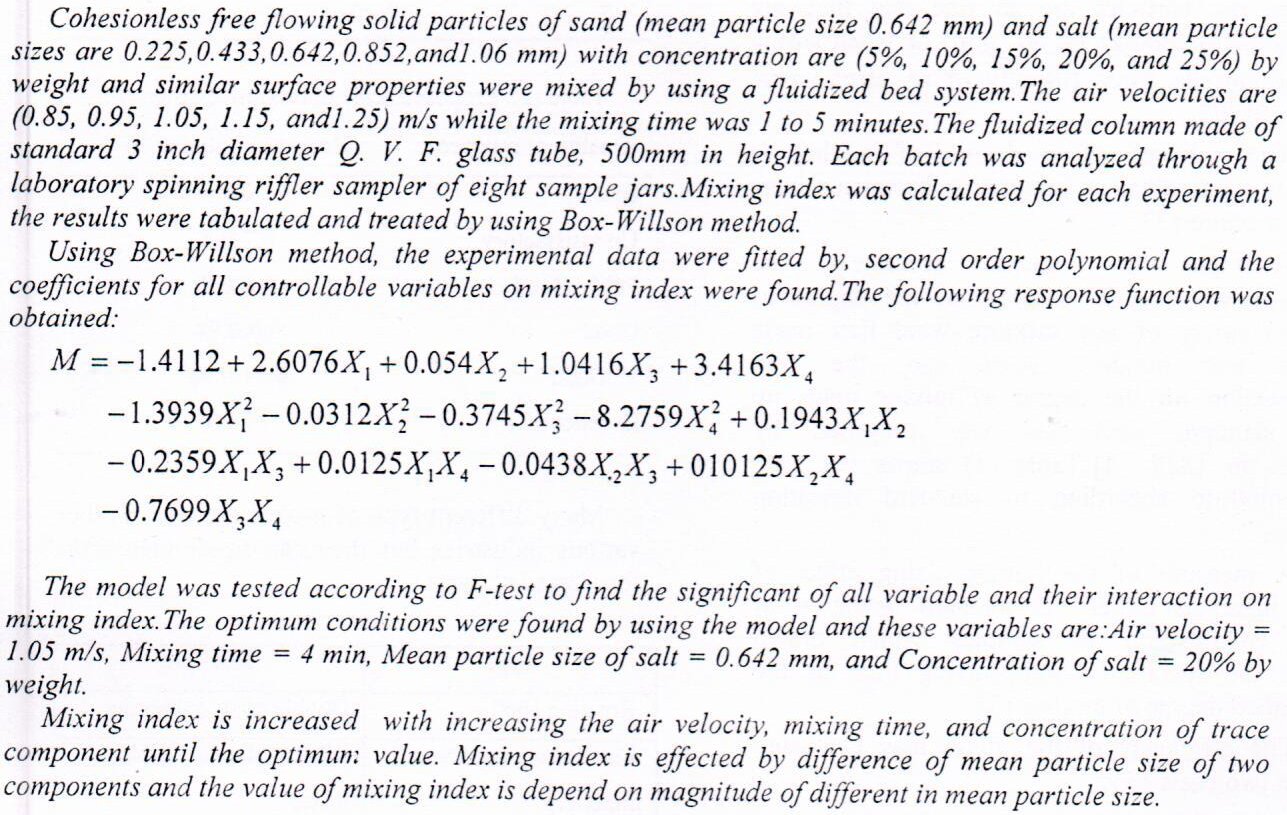
The current study presents the simulative study and evaluation of MANET mobility models over UDP traffic pattern to determine the effects of this traffic pattern on mobility models in MANET which is implemented in NS-2.35 according to various performance metri (Throughput, AED (Average End-2-end Delay), drop packets, NRL (Normalize Routing Load) and PDF (Packet Delivery Fraction)) with various parameters such as different velocities, different environment areas, different number of nodes, different traffic rates, different traffic sources, different pause times and different simulation times . A routing protocol.…was exploited AODV(Adhoc On demand Distance Vector) and RWP (Random Waypoint), GMM (Gauss Markov Model), RPGM (Refere
... Show More (5)
(5)
 (2)
(2)
An experiment was conducted in a greenhouse - research station B - College of Agricultural Engineering Sciences, University of Baghdad, during the fall season of 2018 with the aim of propagating and initially studying the field performance of 18 and 20 potential potato lines derived from Rivera and Arizona cv. after in vitro exposure of nodal segments to different dosages of gamma rays (0, 10, 20, and 30 Gray) and EMS (0, 10, 20, and 30 mM). Each control cultivar and their derived lines were independently cultured in plastic bags according to the RCBD, with three replications. The results showed that the highest plant height and number of leaves were obtained from Arizona derived lines which gave 60.11 cm and 25.30 leaves.plant-1 in
... Show More (9)
(9)
 (2)
(2)
An experimental program was conducted to determine the residual of composite Steel Beams-Reinforced Concrete (SB-RC) deck floors fabricated from a rolled steel beam topped with a reinforced concrete slab, exposed to high temperatures (fire flame) of 300, 500, and 700ºC for 1 hour, and then allowed to cool down by leaving them in the lab condition to return to the ambient temperature. The burning results showed that, by exposing them to a fire flame of up to 300ºC, no serious permanent deflection occurred. It was also noticed that the specimen recovered 93% of 19.2 mm of the deflection caused by burning. The recovered deflection of burned composite SB-RC deck floor at 500ºC was 40% of 77.9 mm of the deflection caused by burning with a res
... Show More (6)
(6)
 (4)
(4)
Many biological tests were done to study the effect of the crude alcoholic leaves extracts on the biological characteristics at the larvae fruit fly Ceratitis capitata with different concentrations of the extracts exposed 1,2,3,5 and 7.5 % at constant laboratory conditions includes the temperature and the relative humidity (27±2C0&70±5 % respectively). The results of the experiments showed that the alcoholic extracts of the plant effected the growth and the development of the larvae and pupae according to the concentrations . The alcoholic extracts proved to have the highest mortality tend to 66.76 % in larva treated with alcoholic at concentration 7.5 % the
... Show MoreThe research aims at shedding light on the impact of the organizational commitment on the performance of the Iraqi insurance company as a service company that provides many services to customers both internal (individuals working) or external, Whenever the company was able to adopt new concepts to increase the understanding and knowledge of how their attention to individuals working and to provide an appropriate working environment, and to clarify the objectives and strategies for them, and create a sense of their importance, as reflected on job performance in attracting new customers, and build long-term relationships with them . In order to achieve this, the research relied on the questionnaire as a main tool for collecting data and in
... Show MoreThe aim of the research is to reveal the reality of teacher performance evaluation in the Sultanate of Oman in light of some global models. The study followed a qualitative descriptive research design. Seven forms of teacher formative and summative assessments were analyzed. Besides, an analytical template was developed, consisting of six areas related to the teaching performance of teachers. These included: lesson planning and preparation, learning environment, education, professional development, student academic, and community and parental partnership. The study reached a number of results; the most notable is the lack of change of forms for more than a decade despite the rapid development of the educational system in the sultanate in
... Show More (1)
(1)
The research aims to know the impact of workers values on their performance which is reflected on increasing productivity and improving its quality as well as the organization's progress and success. Application of this research took place in the General Company Of Electrical Industries; it contained four main pillars; the first involved research methodology، regarding the problem، importance، aim، basic theory، and method of data collection، the second is dedicated to the theoretical framework related to the research basic variables (values and workgroups) the third is assigned to analyze the actual data by using number of statistical methods، such as mathematical medium and standard deviation and also spearman rank
... Show MoreThis study assesses the short-term and long-term interactions between firm performance, financial education and political instability in the case of Malaysia Small to Medium Enterprises (SMEs). The simultaneous insertion of financial education and political instability within the study is done intentionally to inspect the effect of these two elements in one equation for the Malaysian economy. Using the bound testing methodology for cointegration and error correction models, advanced within an autoregressive distributed lag (ARDL) framework, we examine whether a long-run equilibrium connection survives between firm performance and the above mentioned independent variables. Using this method, we uncover evidence of a positive long-term link b
... Show More (2)
(2)
